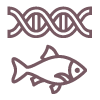 GM animals
GM animals

Does the country produce GM animals?
There are two transgenic mosquitoes approved for commercial use. The aim is to reduce the population of Aedes aegypti mosquitoes, which are primary vectors of dengue and other diseases, such as chikungunya and zika. These mosquitoes have been already released into the environment and used in various Brazilian cities to control those mosquito-borne diseases. Also, CTNBio approved the use of a transgenic moth to combat the pest Spodoptera frugiperda (fall armyworm) in maize. CTNBio also assessed the application made by AquaBounty and, in May 2021, concluded that the consumption of the transgenic salmon developed by this company is safe for human health.
Brief description of the regulatory framework for GM animals
Brazilian regulation includes the possibility to carry out trials with and commercially produce GM animals, and has enacted specific regulations to address these cases. Risk assessment for the agro-ecosystem and for human and animal health is conducted by the same agency (CTNBio) that assesses GM crop biosafety.

Are there local developments?
Some examples of local developments
• Goats that produce milk containing human glucocerebrosidase (hGCase), “Gluca” and “Beta”, developed by the Universidad de Fortaleza.
• Goats that produce milk with similar properties to human breast milk (containing human lysozyme and lactoferrin), developed by the Universidad de Fortaleza.
• Goats that produce milk containing anti-VEGF antibody (scVEGFmAb), developed by the Universidad de Fortaleza.